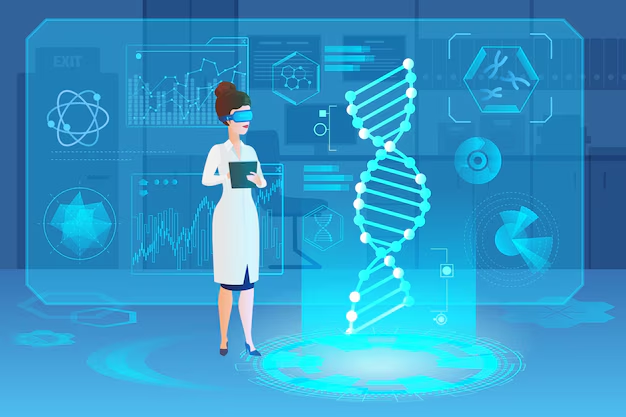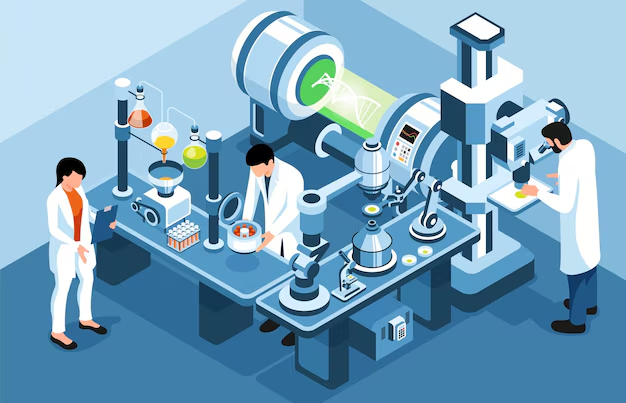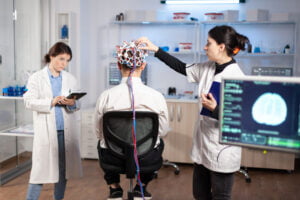Precision medicine is revolutionizing healthcare by moving away from a one-size-fits-all approach to one that is tailored to the unique genetic makeup of each individual. By leveraging genomic data, medical practitioners can better understand a patient’s predisposition to diseases and predict how they will respond to specific treatments.
Artificial Intelligence (AI) has emerged as a game-changer in this domain, offering the ability to process vast amounts of complex genetic data with speed and accuracy. With AI, the potential to unlock personalized treatments based on individual genomic profiles is no longer a futuristic concept but an evolving reality in modern medicine.
This synergy between AI and precision medicine has opened doors to more effective therapies, minimized side effects, and enhanced patient outcomes. From identifying genetic mutations to predicting the efficacy of drugs, AI is enabling healthcare providers to offer treatments tailored to individual needs, marking a significant shift in the way we approach medical care.
In this article, we will delve into how AI is transforming precision medicine, the tools and technologies involved, and the challenges and opportunities that lie ahead.

The Basics of Genomic Profiles
Genomic profiles are detailed representations of an individual’s genetic makeup, derived from analyzing their DNA. These profiles provide critical insights into a person’s genetic variations, hereditary traits, and potential predispositions to certain diseases. By understanding the genomic information unique to each individual, medical professionals can make more informed decisions about diagnosis, treatment, and prevention strategies.
What is a Genomic Profile?
A genomic profile is a comprehensive analysis of the genes within an individual’s DNA. It reveals:
- Genetic Variations: Differences in DNA sequences that may affect health and development.
- Mutations: Specific changes in genes that could lead to diseases like cancer or rare genetic disorders.
- Gene Expression Patterns: How genes are activated or suppressed under different conditions.
How Genomic Data is Collected
The process of creating a genomic profile involves several advanced technologies:
- DNA Sequencing: Techniques like Next-Generation Sequencing (NGS) map the entire DNA structure quickly and accurately.
- Gene Expression Analysis: Tools measure how specific genes are expressed in cells under various conditions.
- Epigenetics: Studies modifications to DNA that influence gene activity without altering the genetic code itself.
Why Genomic Profiles are Important
- Disease Risk Assessment: Identifying genetic predispositions to conditions like diabetes, cardiovascular diseases, and certain cancers.
- Personalized Medicine: Tailoring treatments to align with a patient’s genetic and molecular characteristics.
- Drug Response Prediction: Understanding how an individual may react to specific medications based on their genetic makeup.
Genomic Profiles in Precision Medicine
In the context of precision medicine, genomic profiles act as a roadmap for tailoring healthcare strategies. By combining this data with AI-driven analytics, clinicians can uncover patterns and predictions that were previously unattainable. This level of understanding allows for:
- Early diagnosis of genetic disorders.
- Customization of drug therapies to minimize adverse effects.
- Monitoring the progression of diseases with a molecular lens.

The Role of AI in Precision Medicine
Artificial Intelligence (AI) is at the forefront of revolutionizing precision medicine, enabling healthcare professionals to decode complex genomic data and deliver highly personalized treatments. By leveraging AI’s advanced computational capabilities, researchers and clinicians can process vast datasets, uncover patterns, and make predictions that were previously impossible. This transformative role of AI in precision medicine is reshaping how diseases are diagnosed, treated, and prevented.

AI-Driven Tools for Genomic Analysis
Artificial Intelligence (AI) has revolutionized genomic analysis, enabling researchers and clinicians to decode complex genetic information quickly and accurately. AI-driven tools provide unprecedented insights into genomic data, identifying patterns, predicting outcomes, and advancing personalized medicine. These tools are transforming the way genetic information is analyzed and applied in healthcare, research, and drug development.
1. Genomic Sequencing Technologies Powered by AI
AI enhances the speed and accuracy of genomic sequencing, making it more accessible and efficient.
- Next-Generation Sequencing (NGS) Analysis: AI streamlines the interpretation of large volumes of sequencing data, identifying mutations and genetic markers linked to diseases.
- Error Correction Algorithms: Machine learning models reduce errors in DNA sequencing, improving the reliability of results.
- Real-Time Data Processing: AI enables on-the-fly analysis of sequencing data, accelerating diagnostic processes.
2. AI in Identifying Genetic Variations
One of the key applications of AI is detecting genetic variations and their potential impact.
- Variant Calling: AI algorithms identify variations in DNA sequences that may contribute to specific conditions or diseases.
- Functional Genomics: AI predicts the biological significance of genetic variants by analyzing gene expression data.
- Mutation Prioritization: AI ranks mutations based on their likelihood of causing disease, aiding in targeted research.
3. Predictive Modeling in Genomics
AI’s ability to predict outcomes based on genomic data is transforming personalized medicine.
- Disease Susceptibility Prediction: AI models assess genetic predispositions to conditions such as cancer, diabetes, and cardiovascular diseases.
- Drug Response Forecasting: AI predicts how patients with specific genetic profiles will respond to particular drugs, enabling personalized treatment plans.
- Gene-Environment Interactions: AI analyzes the interplay between genetic factors and environmental influences, offering a comprehensive understanding of disease mechanisms.
4. AI Platforms for Genomic Interpretation
Several AI-powered platforms are leading the charge in genomic analysis:
- DeepVariant: Developed by Google, this tool uses deep learning to improve the accuracy of DNA sequencing results.
- GATK (Genome Analysis Toolkit): Integrates AI to streamline genomic data processing and variant discovery.
- IBM Watson for Genomics: Leverages AI to interpret sequencing data and recommend personalized cancer therapies.
5. AI in Multi-Omics Integration
AI enables the combination of genomic, proteomic, transcriptomic, and epigenomic data for a holistic view of biology.
- Cross-Omics Insights: AI uncovers connections between different data layers, providing deeper insights into disease pathways.
- Biomarker Discovery: AI identifies biomarkers that serve as indicators for diagnosis, prognosis, or treatment efficacy.
- Personalized Omics: AI customizes treatment approaches by integrating multiple biological datasets.
6. Enhancing Data Accessibility and Usability
AI-driven tools improve the accessibility of genomic data by simplifying complex analysis.
- Data Visualization Tools: AI creates intuitive visualizations of genomic data, making it easier for researchers and clinicians to interpret findings.
- Cloud-Based Genomics Platforms: AI-enabled platforms facilitate collaborative analysis of genomic datasets across institutions.
7. Applications in Real-World Scenarios
- Oncology: AI tools identify mutations in cancer genomes, enabling targeted therapies.
- Rare Genetic Disorders: AI helps pinpoint the genetic causes of rare diseases by analyzing patient genomes.
- Drug Development: AI accelerates the identification of genetic targets for new drug therapies.
Benefits of AI in Precision Medicine
The integration of Artificial Intelligence (AI) into precision medicine is revolutionizing healthcare by enabling highly personalized, data-driven approaches to diagnosis, treatment, and prevention. From analyzing genomic data to predicting treatment outcomes, AI provides numerous benefits that improve patient care, reduce healthcare costs, and accelerate medical research.

1. Enhanced Accuracy in Diagnosis
AI algorithms process vast amounts of medical and genomic data to deliver more precise and timely diagnoses.
- Disease Detection: AI identifies patterns in genetic and clinical data, aiding in the early detection of diseases like cancer or rare genetic disorders.
- Eliminating Human Error: Machine learning models reduce diagnostic errors, leading to more reliable outcomes.
2. Personalized Treatment Plans
AI tailors medical treatments to individual patients by analyzing their unique genetic makeup.
- Drug Optimization: AI predicts how patients will respond to medications, helping doctors choose the most effective and least harmful treatments.
- Targeted Therapies: By understanding molecular-level variations, AI recommends treatments specifically designed for a patient’s condition.
3. Accelerated Drug Discovery
AI shortens the timeline for drug development by identifying potential drug targets and testing efficacy faster.
- Virtual Screening: AI simulates drug interactions with specific genetic profiles, narrowing down viable candidates.
- Repurposing Existing Drugs: AI identifies new applications for existing medications based on genetic data.
4. Improved Risk Assessment
AI enhances the ability to predict an individual’s risk of developing certain conditions.
- Predictive Analytics: AI models assess genetic predispositions to diseases, enabling early intervention.
- Proactive Monitoring: Real-time insights from AI-powered health monitoring devices help prevent complications.
5. Cost Efficiency
AI reduces healthcare costs by optimizing processes and minimizing unnecessary treatments.
- Streamlined Workflows: Automated data analysis saves time and resources in clinical and research settings.
- Preventive Care: Early disease detection and intervention lower long-term treatment expenses.
6. Integration of Multi-Omics Data
AI can analyze and integrate diverse biological datasets for a comprehensive understanding of patient health.
- Holistic Insights: Combining genomic, proteomic, and epigenomic data provides a detailed view of disease mechanisms.
- Customized Therapies: Multi-omics analysis allows for more refined and personalized treatment strategies.
7. Real-Time Monitoring and Feedback
AI-powered tools enable real-time tracking of patient health and treatment progress.
- Smart Devices: Wearable technology, integrated with AI, provides continuous health data, enabling immediate adjustments to treatment plans.
- Dynamic Treatment Updates: AI adapts therapies based on ongoing patient response and evolving data.
8. Democratization of Healthcare
AI makes precision medicine more accessible by automating complex processes and scaling solutions.
- Global Reach: AI tools can be deployed in resource-limited settings, expanding access to personalized healthcare.
- Reduced Expertise Barrier: User-friendly AI platforms empower healthcare providers with limited specialization to leverage advanced genomic insights.
9. Accelerated Research and Innovation
AI enables researchers to uncover new insights into disease mechanisms and treatment strategies.
- Pattern Discovery: AI identifies correlations in data that lead to new medical hypotheses.
- Efficient Clinical Trials: AI improves participant selection and monitors trial progress more effectively.
10. Patient Empowerment
AI provides patients with greater understanding and control over their health.
- Genetic Insights: AI interprets genomic data in ways that are accessible and actionable for patients.
- Enhanced Decision-Making: AI equips patients with the knowledge to make informed decisions about their healthcare.
Real-World Applications and Case Studies in AI-Powered Precision Medicine
AI-driven precision medicine is no longer just a concept but a transformative force in healthcare. It is being applied across various domains to address complex medical challenges, optimize treatments, and improve patient outcomes. Real-world applications and case studies illustrate the profound impact AI has on personalized healthcare.
1. AI in Oncology
Cancer treatment has been significantly advanced through AI-powered precision medicine.
- Case Study: IBM Watson for Oncology
IBM Watson analyzes patient data, including genetic profiles, to recommend personalized cancer treatments. In one study, Watson matched oncologists’ recommendations 90% of the time, improving treatment efficiency and accuracy. - Application: Tumor Profiling
AI systems analyze tumor genomes to identify mutations and recommend targeted therapies, minimizing side effects and improving outcomes.
2. Rare Genetic Disorder Diagnosis
AI excels in identifying and diagnosing rare genetic disorders.
- Case Study: DeepGestalt by FDNA
This AI platform uses facial recognition and genetic data to diagnose rare syndromes with an accuracy of over 90%, outperforming traditional diagnostic methods. - Application: Rapid Whole Genome Analysis
AI tools reduce the time required to analyze genomes, making them critical in neonatal intensive care units (NICUs) for diagnosing genetic conditions in infants.
3. Cardiovascular Precision Medicine
AI is improving risk prediction and treatment personalization for heart diseases.
- Case Study: Mayo Clinic’s AI ECG Model
The Mayo Clinic uses AI to detect previously unrecognized conditions, such as asymptomatic left ventricular dysfunction, from standard ECG data. - Application: AI-Powered Risk Models
AI evaluates genetic, lifestyle, and clinical data to predict cardiovascular risks and tailor interventions.
4. AI in Drug Development
AI accelerates drug discovery by identifying promising candidates and repurposing existing drugs.
- Case Study: BenevolentAI and Baricitinib
BenevolentAI’s platform identified Baricitinib as a potential treatment for COVID-19 in just weeks by analyzing genomic and clinical data. - Application: Genomic Target Discovery
AI processes genomic datasets to uncover new drug targets for diseases with unmet medical needs.
5. Neurological Disorders
AI aids in diagnosing and treating conditions like Alzheimer’s and Parkinson’s disease.
- Case Study: Neuro track’s Cognitive Health Platform
This AI-powered tool analyzes eye movement to detect early signs of Alzheimer’s, enabling early intervention. - Application: Genomic Insights into Neurological Diseases
AI identifies genetic risk factors for neurological conditions, aiding in the development of preventive strategies.
6. Infectious Disease Management
AI is being used to predict outbreaks and personalize treatment for infectious diseases.
- Case Study: BlueDot in COVID-19
BlueDot’s AI identified the COVID-19 outbreak in Wuhan before global health organizations issued alerts, demonstrating the power of predictive AI in public health. - Application: Genomic Epidemiology
AI tracks viral mutations to inform vaccine development and treatment strategies.
7. AI in Mental Health Care
AI assists in identifying mental health conditions and tailoring therapeutic approaches.
- Case Study: Woebot
This AI-driven chatbot uses natural language processing to provide personalized mental health support, offering scalable care solutions. - Application: Predicting Treatment Response
AI analyzes genetic and clinical data to predict how patients will respond to psychiatric medications, reducing trial-and-error approaches.
8. Prenatal and Reproductive Health
AI is transforming maternal and fetal care through precision medicine.
- Case Study: AI in Non-Invasive Prenatal Testing (NIPT)
AI analyzes cell-free fetal DNA to detect genetic abnormalities with high accuracy, ensuring safer and earlier diagnoses. - Application: Personalized Fertility Treatments
AI predicts ovulation patterns and tailors fertility treatments based on genetic and hormonal data.
9. AI in Diabetes Management
AI provides personalized insights into diabetes care, helping patients manage their condition effectively.
- Case Study: Google’s DeepMind and EyePACS
This collaboration uses AI to detect diabetic retinopathy through retinal scans, enabling early intervention to prevent vision loss. - Application: AI-Driven Insulin Dosing
AI-powered systems recommend precise insulin dosages based on real-time glucose monitoring and genetic factors.
10. Genomic Data Integration for Public Health
AI is driving large-scale genomic studies to inform public health strategies.
- Case Study: UK Biobank and Deep Learning Models
AI analyzes extensive biobank data to uncover genetic links to diseases, helping design population-level interventions. - Application: Pandemic Preparedness
AI integrates genomic, environmental, and clinical data to predict and mitigate future pandemics.
Conclusion
The integration of AI into precision medicine is a game-changer for the healthcare industry, offering personalized, data-driven approaches that enhance patient outcomes. From genomic analysis to targeted treatments, AI empowers healthcare professionals to make more accurate diagnoses and select the most effective therapies for individual patients. As a result, the potential for improving the quality of care, reducing healthcare costs, and accelerating medical advancements is immense.
As AI continues to evolve, its role in precision medicine will only grow stronger. With real-world applications already demonstrating significant benefits in oncology, cardiovascular care, and genetic disorder diagnosis, the future of personalized healthcare looks promising. By harnessing the power of AI, we can expect to see even more innovative solutions that will further transform the landscape of healthcare, ultimately improving lives on a global scale.











